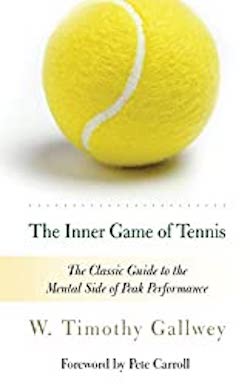The Inner Game of Tennis, by Timothy Gallwey

You don’t need to play tennis to read this book, although you must be aware that some parts contain detailed descriptions of tennis games and techniques.
This book promises to teach the mental side of peak performance. The author proposes a simple but powerful message. Our external goals may be many and various and require learning many skills to achieve them. But “the inner obstacles come from only one source and the skills needed to overcome them remain constant.”
When playing tennis or other sports, and in many other things in life, there is an inner dialog between two selves —Self 1 and Self 2— that reside inside us.
Self 1 is the ego-mind that wants to take responsibility for making things “better”, although most of the time its interventions interfere with the natural abilities of Self 2. Self 1 wants the credit for playing an important role in things.
Self 2 is the body, including the brain, memory bank (conscious and unconscious), and the nervous system. Its native tongue is images, especially sensory images. “Getting the clearest possible image of your desired outcomes is a most useful method for communicating with Self 2, especially when playing a match.”
To achieve peak performance, we need to get ourselves together mentally. This “requires slowing the mind. Quieting the mind means less thinking, calculating, judging, worrying, fearing, hoping, trying, regretting, controlling, jittering, or distracting. The mind is still when it is here and now in perfect oneness with the action and the actor.”
Change
Many times, the usual way of learning goes something like this: criticize or judge past behavior; tell yourself to change, instruct with command words repeatedly; try hard, make yourself do it right; judge critically your results, and try again.
This seldom works. The author proposes four steps for making change happen:
- Non-judgmental observation.
- Picture/plan the desired outcomes.
- Trust Self 2. Let it happen without letting Self 1 intrude.
- Non-judgemental, calm observation of change and results, leading to continuing observation and learning.
The first skill to learn is letting go of the human inclination to judge ourselves and our performance as either good or bad. Self-judgments tend to become self-fulfilling prophecies. “Once the judgmental mind establishes a self-identity based on its negative judgments, the role-playing continues to hide the true potential of Self 2 until the hypnotic spell is broken. In short, you start to become what you think.”
Not all remarks are judgmental. Letting go of judgments does not mean ignoring errors. It means seeing events as they are and not adding anything to them. “The first step is to see your strokes as they are. They must be perceived clearly. This can be done only when personal judgment is absent. As soon as a stroke is seen clearly and accepted as it is, a natural and speedy process of change begins.” (p. 21) “When the mind is free of any thought or judgment, it is still and acts like a mirror. Then and only then can we know things as they are.” (p. 24)
The best way to quiet the mind is not to tell it to shut down, but to learn to focus.
As one achieves focus, the mind quiets. As the mind is kept in the present, it becomes calm. Focus means keeping the mind now and here. Relaxed concentration is the supreme art because no art can be achieved without it, while with it, much can be achieved. One cannot reach the limit of one’s potential in tennis or any endeavor without learning it; what is even more compelling is that tennis can be a marvelous medium through which skill in focus of mind can be developed. By learning to focus while playing tennis, one develops a skill that can heighten performance in every other aspect of life.
The message of the Inner Game is simple: focus. Focus of attention in the present moment, the only one you can really live in, is at the heart of this book and at the heart of the art of doing anything well. Focus means not dwelling on the past, either on mistakes or glories; it means not being so caught up in the future, either its fears or its dreams, that my full attention is taken from the present. The ability to focus the mind is the ability to not let it run away with you. It does not mean not to think—but to be the one who directs your own thinking.
Stop caring about the outcomes and play it all out.